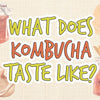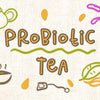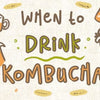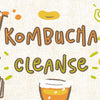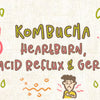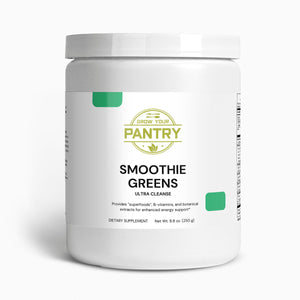Can Kids Drink Kombucha? The Parent's Guide
Kids aged over 12 can drink the store brought kombucha. For kids under 12, it is not recommended. Store brought kombucha tends to be sold just like any other soft drink: non-alcoholic, fizzy, and sweet. The effects for a child would also be similar to other sweet, fizzy drinks. There are a few ingredients that you need to be made aware of before giving to children. This post delves into all of kombucha's ingredients, effects, and considerations you’ll need to make before letting your child drink kombucha.
Ingredient Considerations
The number of ingredients to make kombucha are relatively few: tea, water, sugar, and a SCOBY. After production, a few chemical by-products are present, including alcohol and caffeine. Here is a breakdown of the potential chemicals and ingredients that you should consider before giving your child kombucha.
Alcohol - Commercially produced kombucha contains trace amounts of alcohol. Under 0.5% ABV, drinks are sold as a non-alcoholic beverage.
In contrast homebrewed kombucha, can contain up to 3% ABV. It is not recommended for children to drink kombucha. In the USA, it's illegal for anybody under 21 to consume alcohol.
If you're considering giving your child kombucha, be sure that it's the non-alcoholic variety.
Caffeine - In the process of making kombucha, you steep tea in water, this gives the kombucha a distinct flavor. Depending on the type of tea and how much you use, the amount of caffeine in your kombucha can vary - it usually contains between 4mg - 40mg of caffeine. Caffeine is not recommended for kids. There have been many studies showing the harmful effects of caffeine in children, and therefore not recommended.
Medical advice suggests that children under 12 should not consume any caffeine.
For children aged 12 and up, the maximum daily dosage is 80mg. Before consuming check the packaging to be sure that your child would be within their recommended threshold.
Sugar - One of the main ingredients in kombucha is sugar. The SCOBY feeds on the sugar, which causes the fermentation of tea. Sugar has become a controversial topic in health for its purported effects. The UK health service recommends no more than 30g of sugar per day for children. For commercially produced kombucha, the average 8oz (227ml) bottle contains between 2-7g of sugar.
This is within the threshold for children to be able to consume within a balanced diet.
Oral Health - Oral health is especially important for children. Parents worry if the food and drinks their child consumes are affecting their teeth. Kombucha could negatively affect your oral health due to containing tea and sugar. Tea has the potential to stain teeth, especially if your mouth is not washed out afterward. Sugar can contribute to tooth decay over time.
Brewing Kombucha With Kids
Brewing kombucha can be a fun and enjoyable process. Before fermenting kombucha with your children, be sure to find recipes that match the following criteria:
-
Low-Alcohol
-
Non or Very Low Caffeine
-
Low-Sugar
After production, test the alcohol content of your batch using a digital or manual hydrometer to determine the ABV quickly.
Pasteurization And Children

In most countries, drinks need to be pasteurized before being sold to the public. The pasteurization process kills all bacteria in your brew. Often companies then add probiotics afterward.
You're not likely to consume probiotics that come from the kombucha ferment. Instead, you'll consume probiotics that have been grown under controlled conditions.
Therefore if you're looking to buy commercially produced kombucha for the probiotic effects, it may be better to find another food or beverage that contains probiotics without any other unwanted ingredients.
Health advice often recommends pasteurizing all drinks that contain bacteria before a child drinks it. Children are more prone to infection, disease, and sickness due to a weaker immune system. Therefore if you're homebrewing your kombucha for a child to drink, then it may be suggested to pasteurize it before consuming correctly.
Potential Benefits For Kids Drinking Kombucha
Probiotics are one of the most talked-about benefits of kombucha. They're said to help balance your gut bacteria and improve your immunity, to name a few of the many purported benefits. When speaking to parents, they're often worried about their child's immunity, especially in the winter months, where it's often common to get sick.
Do Kids Need Extra Probiotics?
"Generally speaking, probiotics are safe for kids, unless your child has a compromised immune system, cancer or is a premature infant," said Dr. Samonte. "In that case, probiotics can put children at risk for infections." - Source: Geisinger. From this Dr., you can see that there isn't a clear answer or guidance for you to follow.
Other Ways To Get Probiotics
If you've decided not to allow your child to drink kombucha, but are still looking for a source of probiotics, you can get them from drinks such as kefir and Yakult or by giving them naturally fermented yogurts. There are 100's of ways that children can get extra probiotics without consuming caffeine.
Kid-Friendly Kombucha Options
The table shows 5 of the most popular kombucha brands and also indicates the amount of sugar, caffeine, and alcohol they contain. From this, you can see that all of these brands are safe for children over 12 to drink. You can also see from this table that none of the brands are suitable for children under 12 to drink due to containing caffeine.
Brand8oz Bottle |
Sugar Content(g) |
Caffeine(mg) |
Alcohol(% ABV) |
GT's |
6 |
8-14 |
<0.5 |
KeVita |
9 |
40 |
<0.5 |
Brew Dr. |
7 |
7.5 |
<0.5 |
Humm |
8 |
14 |
<0.5 |
Common Questions
At What Age Can You Drink Kombucha?
Due to the caffeine contents, it's not recommended for any child under the age of 12 to consume kombucha. Once over the age of 12, you can consume kombucha that contains less than 80mg of caffeine per serving. Once an adult, you should follow the FDA guidelines for consumption.
Can You Bring Kombucha To School?
We would suggest to speak to your school and ask about their policy. It's been reported that some schools have started to ban kombucha for the reported alcohol and caffeine contents.



